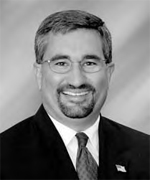December 28, 2009
Family Feud – Don’t Let This Be Your Legacy

By Curt Ford
Nash Nash Bean & Ford
Few things are as heart-wrenching as a dispute among family members. We expect family to be a place of love and relative harmony in our often-tumultuous world. Even the thought of such a horrible occurrence may be unsettling.
But, problems in an estate or trust can often cause deep divisions in a family, divisions that outside forces might never have been able to cause. For example, Dr. Martin Luther King, Jr. and Coretta Scott King’s children, ended up in litigation shortly after Coretta’s 2006 death. The Kings’ three surviving adult children, Dexter, Bernice and Martin Luther III, fought for control of their parents’ financial and historical legacy, including love letters and rights to the famous “I Have a Dream” speech. The fight was exacerbated by the fact that Martin left Dexter as his executor while Coretta left Bernice as her executrix. While the King children reached an out-of-court settlement in 2009, only they know the depth of the remaining animosity over the long family feud. It is certain that the Kings never had a dream that their children would end up in a bitter estate dispute after their deaths.
Unfortunately, the Kings are not the only ones who have left a legacy that included an estate dispute. Countless estates are disputed each year, in and out of court. These disputes do not just occur in the families of the rich and famous, though those disputes are more publicized. What can you do to preserve the harmony in your family in passing on your legacy?
Here are 5 easy steps you can take:
- Plan Professionally. Your legacy is important. Be sure to engage a qualified estate planning attorney who focuses his or her practice in estate planning. Such a professional can design a well-coordinated plan that considers all your assets and wishes.
- Choose Wisely. When planning your estate, you will need to choose people to make decisions for you in case of your incapacity and regarding your legacy after your death. Consider the skills and relationships of the individuals involved. For example, do not choose more than one person to manage your Trust or estate unless you know they can work together.
- Communicate with Your Family. While your death may come as a surprise, your wishes should not. Surprises in your estate plan increase the chances that your legacy might include a bitter dispute. Open, honest communication about your wishes during your life may be the best way to achieve and maintain lasting family harmony after your death.
- Consider a No Contest Clause. A “no contest clause” disinherits anyone who challenges your wishes as set forth in your Will or Trust. Such a clause can be a powerful deterrent to family-destroying estate litigation and shows that you are serious about your desire to maintain family harmony.
- Keep Current. Make sure you keep your estate plan current. Otherwise, people whom you intend to benefit might be excluded unintentionally, disrupting family harmony and prompting a family feud.
When families feud, there are no winners, only losers. Be sure to follow the steps above if you have a dream of family harmony that continues long after your death. Your family needs your help and planning in order to achieve that dream.
Nash Nash Bean & Ford are members of the American Academy of Estate Planning Attorneys and the National Academy of Elder Law Attorneys. To receive a copy of our most recent newsletter “Your Estate Matters” or for a free consultation on Estate or Long Term Care Planning, call 309-944-2188, 309-762-9368 or 1-800-644-5345. You may also contact our firm by email at info@nashbeanford.com or visit our web site at http://www.nashbeanford.com.
The firm devotes its practice primarily in the areas of estate, business and tax planning and related areas of the law, as well as elder law and trust administration and probate. We offer guidance and advice to our clients in every area of estate planning.
This column is designed for general information purposes only, and is not intended, nor should be construed or relied upon, as legal advice. Please consult your attorney if specific legal information is desired.
Nash Nash Bean & Ford are members of the American Academy of Estate Planning Attorneys and the National Association of Elder Law Attorneys.
Filed Under: Finance
Tags: Adult Children, Animosity, Bernice, Coretta Scott King, Court Settlement, Deep Divisions, Dr Martin Luther, Dr Martin Luther King, Dr Martin Luther King Jr, Dream Speech, Executor, Executrix, Family Divisions, Family Feud, Incapacity, Love Letters, Martin Luther King, Martin Luther King Jr, Relative Harmony, Tumultuous World
Trackback URL: https://www.50pluslife.com/2009/12/28/family-feud-don%e2%80%99t-let-this-be-your-legacy/trackback/


